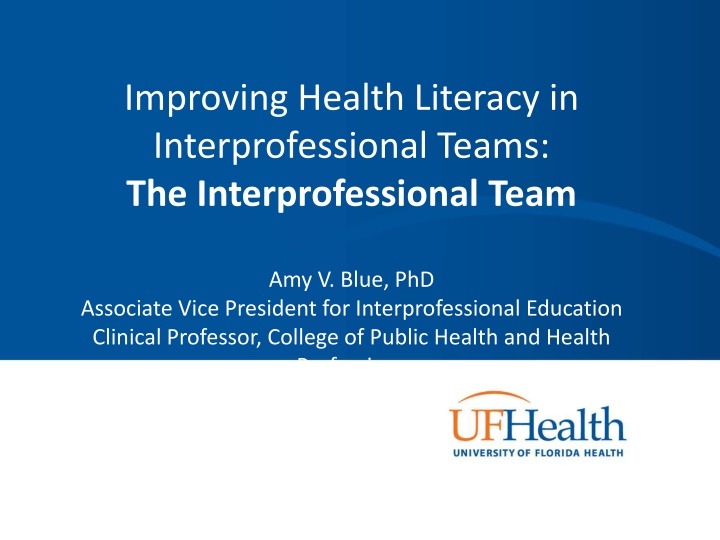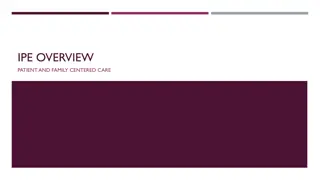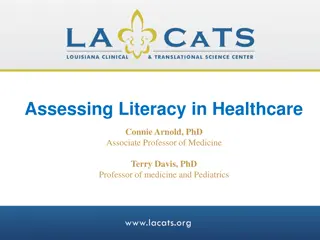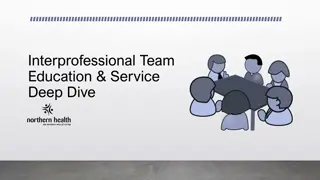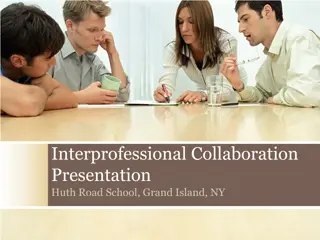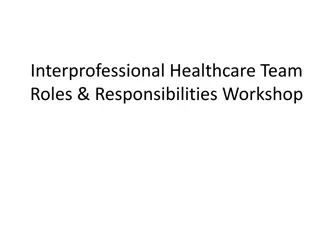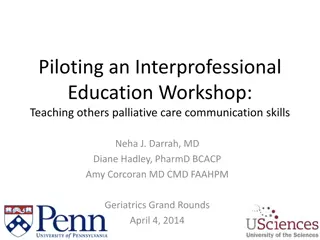Enhancing Health Literacy in Interprofessional Teams
Explore the importance of interprofessional teamwork, communication strategies, and psychological safety in improving health literacy within diverse healthcare settings. Learn how to address jargon-related communication barriers to enhance patient care and outcomes.
Download Presentation

Please find below an Image/Link to download the presentation.
The content on the website is provided AS IS for your information and personal use only. It may not be sold, licensed, or shared on other websites without obtaining consent from the author.If you encounter any issues during the download, it is possible that the publisher has removed the file from their server.
You are allowed to download the files provided on this website for personal or commercial use, subject to the condition that they are used lawfully. All files are the property of their respective owners.
The content on the website is provided AS IS for your information and personal use only. It may not be sold, licensed, or shared on other websites without obtaining consent from the author.
E N D
Presentation Transcript
Improving Health Literacy in Interprofessional Teams: The Interprofessional Team Amy V. Blue, PhD Associate Vice President for Interprofessional Education Clinical Professor, College of Public Health and Health Professions
Learning Objectives 1 2 3 Describe interprofessional collaborative practice Identify communication and teamwork techniques to optimize health literacy in interprofessional teams Describe the value of psychological safety in interprofessional teams and its relation to improving health literacy
Interprofessional Collaborative Practice Happens when multiple health workers from different professional backgrounds work together with patients, families, and communities to deliver the highest quality of care. (WHO 2010)
Interprofessional Collaborative Practice Competencies
Interprofessional Collaborative Practice Competencies
Communication Communicate in a responsive, responsible, respectful, and compassionate manner with team members Use communication tools, techniques, and technologies to enhance team function, well- being, and health outcomes Use Communicate clearly with authenticity and cultural humility, avoiding discipline-specific terminology Communicate
What Are You Saying Patient experienced S.A.
Be Aware of Jargon Vocabulary peculiar to a particular trade, profession, or group Second (third) language to shorten communication
Can create confusion among health professionals, patients and their families Even common phrases may not be well understood by patients and families (Gotlieb et al 2022) Jargon
Avoid Jargon Minimize use of jargon Explain/clarify when need to use it
Shared Mental Models The perception of, understanding of, or knowledge about a situation or process that is shared among team members through communication. Being on the same page From: TeamSTEPPS
Communication for Shared Mental Models PARAPHRASING WHAT YOU RE SAYING IS ASKING CLARIFYING QUESTIONS HOW DO YOU MEAN? PERCEPTION CHECKING
Psychological Safety the degree to which people view the environment as conducive to interpersonally risky behaviors like speaking up or asking for help (Edmondson et al, 2016)
Promoting Psychological Safety Recognize that everyone has something to contribute Look at conflict as way to improve/innovate; find common ground Avoid blame - If you don t understand what is going on, you don t have enough history about the situation. Role model comfort with uncertainty and getting feedback; model fallibility
In Interprofessional Teams 1 2 3 4 Promote health literacy Avoid/minimize jargon (and clarify when used) Create psychologically safe environments Ensure a shared mental model
References WHO Framework for Action (Feb. 2010): http://www.who.int/hrh/resources/framework_action/en/ Interprofessional Education Collaborative Expert Panel. (2011) and 2016. Core competencies for interprofessional collaborative practice: Report of an expert panel. Washington D.C.: Interprofessional Education Collaborative. https://hsc.unm.edu/ipe/resources/ipec-2016-core-competencies.pdf TeamSTEPPS: https://www.ahrq.gov/teamstepps/instructor/index.html Gotlieb R, Praska C, Hendrickson MA, et al. Accuracy in Patient Understanding of Common Medical Phrases. Jama Network Open. 2022;5(11):e224-2972. Goff-Dupnt S. How to Boost Your Team s Success with Shared Mental Models. 2020 Teamwork; December 21, 2020. How to boost your team s success with shared mental models - Work Life by Atlassian Porath C, Amir E. Does rudeness really matter? The effects of rudeness on task performance and helpfulness. Academy of Management. 2007;50:1181-1197. Porath C, Erez A. Overlooked but not untouched: how rudeness reduces onlookers performance on routine and creative tasks. Organizational Behavior and Human Decision Processes. 2009;109:29-44. Foulk T, Woolum A, Erez A. Catching rudeness is like catching a cold: the contagion effects of low intensity negative behaviors. J of Applied Psychology. 2016; 101:50-67. Riskin A, et al. The impact of rudeness on medical team performance: a randomized trial. Pediatrics. 2015;136:487-495. Edmondson AC, Higgins M, Singer S, Weiner J. Understanding Psychological Safety in Health Care and Education Organizations: A Comparative Perspective. Research in Human Development. 2016;March:65-83 Delizonna L. High-performing teams need psychological safety. Here s how to create it. Harvard Business Review. August 25, 2017. https://hbr.org/2017/08/high-performing-teams-need-psychological-safety-heres-how-to-create-it
Thank You!
